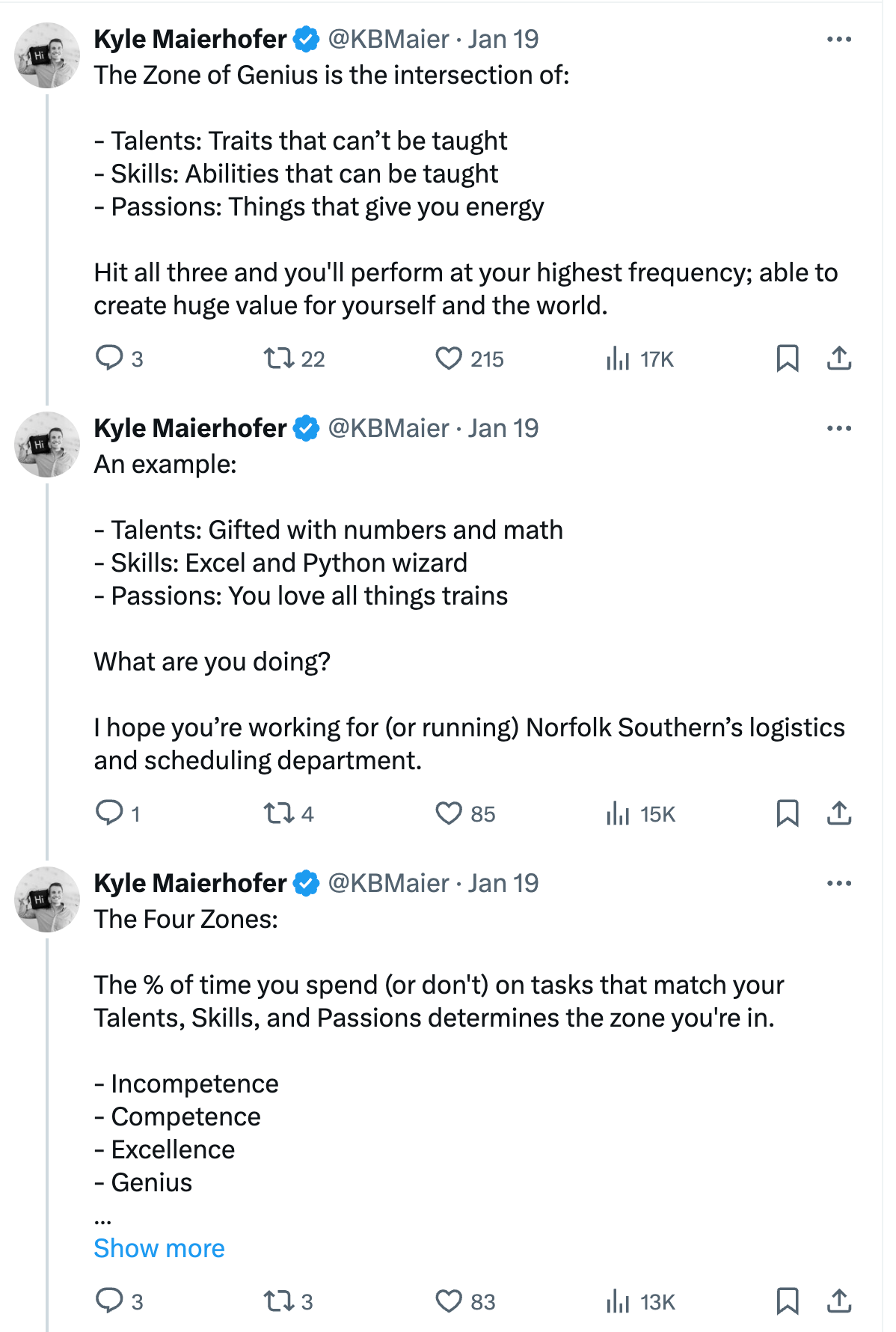Some people call it a zone of genius. I call it the zone of awesome. That’s because ‘genius’ has a lot of pressure and I’m anti adding any more pressure in my life.
But what is this zone that we’re supposed to attain?
It’s an old method that’s been talked about for years, but Mathilde Collin on Medium made a lovely summary from Matt Mochary. Here you go:
“If you don’t know about the concept of “zone of genius”, here is a 1-minute summary. Every single activity you perform during the day falls within one of four zones:
1. “Zone of Incompetence: Activities that other people probably do better than you (e.g. fixing your car).
2. “Zone of Competence: Activities that you do just fine, but others are as good as you at them (e.g. cleaning your bathroom).
3. “Zone of Excellence: Activities that you are excellent at — better than most, in fact — but don’t love doing.
4. “Zone of Genius: Activities that you are uniquely good at in the world, and that you love to do, so much so, that time and space likely disappear to you when you do them.”
Yesterday, on Easter, my husband posted a video of me trying to make deviled eggs. Every time I try to make deviled eggs, I have massive issues when it comes to peeling those eggs.
I am obviously in that zone of incompetence when it comes to egg peeling. I broke that egg in half, which is why it is vertical.
This concept is a hot one. We all want to be in that zone, right? Here’s the start of a thread all about it on X.
Collin and others say that a good way to find your zone is to do an energy audit. This just means:
Look at how you spend your time for work-related stuff for two weeks.
Track that time.
Get some highlighters are look at every hour and say, “Did that drain me or charge me up?” Make draining one color. Enliven another. All hours must have one of these two colors.
Write out each color into a list form.
Get rid of the draining tasks somehow. She suggests eliminating, outsourcing or tweaking that task to “make it awesome.”
On his blog, Tim Denning talks about where the zone of genius isn’t. And he talks a lot about how skills can be created, learned.
He writes,
“The spiritual gurus want you to believe you have natural-born talents and these are part of your zone of genius.
“I disagree.
“What you’re born with isn’t all you get in life. You can be born an introvert and become an extrovert. You can be born bad at math and later in life become a master of numbers.
“The idea we’re born with fixed skills we should focus on is bullsh*t.
“We’re not our DNA or our programming. This is the modern lie victim culture has embedded in our minds, so we’ll fund their GoFundMe campaigns, therefore letting them sit on the couch.”
THE FLOW STATE
The point is this: You can learn. You can develop. You can get better at things.
Dennings talks more about the flow state as a place to find your zone. We’ve talked about that before here, too.
As I wrote before (link below),
“The best moments in our lives are not the passive, receptive, relaxing times . . . The best moments usually occur if a person’s body or mind is stretched to its limits in a voluntary effort to accomplish something difficult and worthwhile” - (Csikszentmihalyi, 1990).
A long time ago – back in the 1980s – this guy Mihaly Csikszentmihalyi was studying happiness. He gave people pagers. Remember this was in the 1980s. Then he and his research assistants would send the people messages at random times and ask how they were doing, feeling, what they were doing, etc. It sounds a bit like when your mom texts you, honestly.
And he discovered flow. People were happy when they were super engaged in the task they were doing. People weren’t happy when they were doing nothing. They were happy when they were involved in something. Playing soccer. Playing music. Creating art. Solving a problem.
Minds were blown.
When people were in the ‘flow,’ they forgot about time, space, all the other detritus in their lives. They were focused on the now, on what they were doing. What they were doing might be writing, sports, hanging out with other humans, art, and so on… But for them the involvement was so intense that they became engaged and absorbed into it and were happy.
HOW THIS RELATES TO THE ZONE OF AWESOME/GENIUS
Dennings’ method is the opposite of Collin’s. He says you don’t need to track your activities to get this figured out. You just have to notice when flow is happening, when you lose track of time, when work doesn’t feel bad.
“Your zone of genius lies at the intersection of flow, obsession, high energy, and work that doesn’t feel like work,” he writes.
And also, don’t get stuck on that word, ‘genius.’ Just be happy. Lean into the things that make you happier, okay?
“There is no normal/average. A 'normal person' is what is left after society has squeezed out all unconventional opinions and aspirations out of a human being."
– Sylvia Path
LINKS TO LEARN MORE:
https://www.frontiersin.org/articles/10.3389/fpsyg.2021.645498/full
https://www.ncbi.nlm.nih.gov/pmc/articles/PMC5763465/
https://www.medicalnewstoday.com/articles/flow-state
Finding Flow
“The best moments in our lives are not the passive, receptive, relaxing times . . . The best moments usually occur if a person’s body or mind is stretched to its limits in a voluntary effort to accomplish something difficult and worthwhile” - (Csikszentmihalyi, 1990).






I so agree that talent isn’t inborn but developed and nurtured. I see that in my kids. I see it when I compare where my writing started with where it is now. I have tons left to learn but have gotten better than I imagined my ‘talent’ would ever allow.